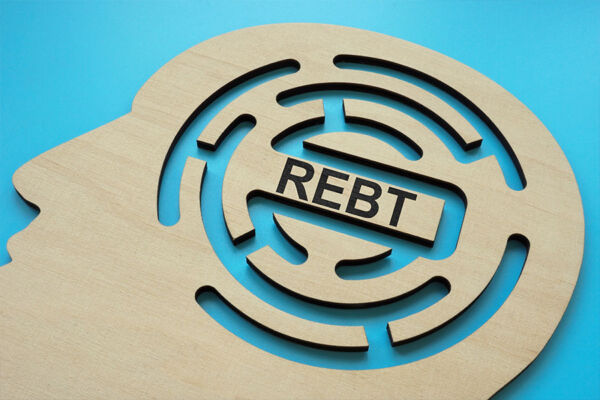Rational Emotive Behavior Therapy or REBT is a form of Cognitive Behavior Therapy (CBT) that was developed by Dr. Albert Ellis in the 1950s.1 In REBT, our emotional upsets are a result of how we think about events and problems, not the problems themselves. The goals of REBT are to help individuals develop rational thinking patterns and coping strategies, leading to improved emotional and behavioral responses. Because REBT is a tenant of CBT, it is helpful to have a clear understanding of what CBT is.

Rational Emotive Behavior Therapy and Cognitive Behavior Therapy
Cognitive Behavioral Therapy has been extensively researched and proven effective in treating a variety of mental health disorders and other problems including but not limited to:2
- Anxiety disorders
- Depression
- Marital issues
- Substance use disorders
- Eating disorders
The basic premise of CBT is that your thoughts and behaviors contribute to psychological distress and by changing your behaviors and emotions, you can improve your functioning. More specifically CBT postulates that:2
- Psychological challenges and mental health issues are a result of unhelpful or faulty ways of irrational beliefs.
- Psychological problems are based on learned patterns of unhealthy and unhelpful behavior.
- You can relieve your symptoms and be more effective in your life through learning better ways of coping with your irrational beliefs.
How REBT Differs from Traditional CBT
What makes Rational Emotive Behavioral Therapy (REBT) unique from CBT is its emphasis on irrational and rational beliefs; rational beliefs are described as flexible, logical, and non-extreme while the four core irrational beliefs are categorized as illogical, rigid, and extreme.3 Your rational and irrational beliefs influences your behaviors and thoughts in REBT.
More specifically, research investigating irrational beliefs show that it lead to maladaptive behaviors and unhealthy negative emotions.3Contrarily, rational beliefs contribute to healthy negative emotions and adaptive behaviors that get you closer to achieving your goals.3 Maladaptive behaviors can be thought of as behaviors that don’t serve a positive purpose for you.
REBT recognizes the difference between negative emotions and believes that negative emotions such as anxiety, fear, or disappointment can be healthy or unhealthy. Reducing irrational beliefs and increasing rational beliefs will lead to an increase in healthy negative emotions and a decrease in unhealthy negative emotions.3
What distinguishes a healthy emotion from an unhealthy emotion is the resulting behaviors and whether the behaviors get you closer or farther away from your goals.3 In other words, anxiety is a healthy negative emotion if it helps you study for your test and pass the exam. It is an unhealthy negative emotion when it causes you to avoid studying and fail the test. Negative emotions can’t be avoided. However, with REBT you can determine whether your negative emotions help you or hurt you in achieving your goals and creating a high-quality life for yourself.

ABC of REBT
With REBT, it is not the events themselves that cause behaviors and emotions, it is the underlying beliefs you have about the events that lead to behavioral and emotional reactivity and dysfunction.3 To help solidify this concept, REBT uses the ABC model or framework.
Within the ABC framework:3
- A represents the Activating event.
- B represents the Beliefs you have about the activating event.
- C represents the emotional response and behavioral Consequences you have because of your beliefs.
The ABC model is a powerful tool in helping you understand concepts of REBT as well as recognizing the control you have over your behaviors, thoughts, and emotions. The ABC framework helps empower you to recognize that it’s not outside events that cause dysfunctional emotions and behaviors; it presents strong evidence relating irrational beliefs with the events that contribute to dysfunction.3 Therefore, if you change your core beliefs, you can change your behaviors and emotions and improve your overall functionality. REBT puts the power in your hands.
Characteristics of REBT
REBT doesn’t focus much on the past and instead targets current mental health conditions and life goals. REBT is active and encourages you to actively change the way you think about situations to help improve your life satisfaction and achieve unconditional self acceptance.
REBT focuses on present moment experiences and places emphasis on current thoughts, attitudes, emotions, and behaviors that contribute to poor quality of life, emotional distress and low life satisfaction.1 If you are experiencing unhealthy behaviors such as poor sleeping habits, problems in relationships, and/or substance abuse issues, REBT may be suitable for you.
Rational Emotive Therapy For Addiction
If you are struggling with mental health and/or substance abuse challenges, help is available to you. Camelback Recovery, the leading addiction and mental health treatment center in Phoenix, AZ, recognizes that each person is unique. That’s why we customize your treatment plan based on your specific needs and recovery goals. We offer a variety of therapeutic approaches that can help you overcome your mental health issues and addiction challenges including Rational Emotive Behavior Therapy. You don’t have to suffer from addiction any longer. Get the help you deserve. Call (602) 466-9880.
Sources:
- The Albert Ellis Institute. (n.d.). Rational Emotive Behavioral Therapy.
- American Psychological Association. (2017). What is cognitive behavioral therapy?
- Turner, M.J. (2016). Rational emotive behavioral therapy (REBT), irrational and rational beliefs, and the mental health of athletes. Frontiers in Psychology, 7, 1423.


